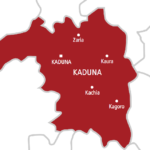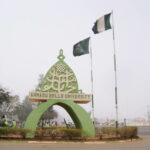Those published and printed in Abuja whose distribution vans fan across the northern part of the country were stopped at various check points by soldiers who apparently had been under express orders to bar newspaper distribution vans from continuing to their sales destinations. As a result on those 2 days, newspapers published by the Media Trust Ltd could not reach its readers in places like Kano, Kaduna, Lokoja, Oshogbo, Port Harcourt, Yola, Bauchi as well as Gombe, Sokoto and Kebbi states. Similar accounts of inability to distribute their newspapers were related by other newspaper companies.
In defence of its action, the military told the Nigerian readership that its action was prompted by “intelligence report indicating movement of materials with grave security implications across the country, using channel of newsprint-related consignments”. Couched cavalierly this way, newspapers companies became suspects as collaborators with those perpetrating the unhappy insecure situation presently prevailing in the country. Yet it cannot be forgotten that not so long ago some newspaper offices were themselves attacked; indeed a car laden with bombs rammed into the Abuja Office of Thisday which, mercifully only blew up a few vehicles parked at the premises. This incident caused other newspapers to take stringent security measures that included fortifying their premises with concrete pillars and availing themselves with armed security men. It is instructive that so far no such incriminating “material with grave security implications” has been found on any newspaper distribution van yet.
So what are we to make of this brief attempt at scuttling newspaper distribution in Nigeria? What prompted it and what end does it serve? But before we attempt to answer these posers, it is worth noting that the military’s action of impeding newspaper distribution must have caused a lot of discomfiture for many a publisher in those two days. These days newspaper publishing is becoming a fraught business with the publishers’ eyes permanently glued to the balance sheet as they struggle to keep up copy sales in the face of dwindling sales figures. For them, the rainy season which we are presently in, is the most inauspicious time as copy sales plummet precipitously because the rains have driven readers with the purchasing power away, making vendors return heaps of unsold, which in turn, causes the volume of copies taken to the market to be reduced. It is a period when sales managers get the blues as they are harangued and badgered for failing to keep sales up to the profit sustaining level.
This is the reason why the newspaper industry is about the only one where there are interminable delays in payment of salaries—the main reason for brown envelopes, unending lay-off of staff and company close-downs, most especially the government owned ones. They explain why publishers wear a permanent scowl and they grow premature grey hair! With this backdrop, one can imagine the impact of the punitive action on newspaper distribution for the two days on the finances of these papers. Surely, those who gave the order to impede newspapers distribution cannot be oblivious of the near perilous state of the newspaper industry. Certainly they are, that was why knowing full well the damage they are inflicting on one of the most resilient and creative sectors of the Nigerian economy, quite apart from the onslaught on its onerous responsibility of informing the public, particularly in a democratic setting, the action was quickly called off.
So what prompted the measure and what purpose does it serve? It is well known that the military has come under critical evaluation recently concerning the difficulties it has been having with the campaign to deal with the insurgency. People have voiced their frustration on how the insurgents could carry on with their murderous campaigns across a wide swathe of the area where they operate without as much as a reprisal attack from the military. Many of these views are purveyed by the newspapers, which also have followed up by putting out uncomplimentary editorials portraying the military as not on top of the insurgency situation. Combined with similar reports of near mutiny situations such as occurred in Maiduguri when disgruntled soldiers reportedly shot at a senior officer on purely welfare reasons, the military started to see itself as being unfairly portrayed as bungling and too preoccupied with easy life.
As an institution not overly given to loudly defending itself when under attack, it suffered these barrages of critical comments for sometime, until only recently when it started putting out its own point of view, making a number of visits to media houses in the process to reason with editors on the insurgency issue and why it looks like its earlier successes are being rolled back. In the days of yore, calmly debating fine points of an issue with “bloody civilians” would have been thought to be beneath its members. In those days, offending newspapers would have since been closed down, with their editors and other noisy busy- body writers promptly carted off and thrown into some dark dungeon for daring to express opinion on matters that concerned the military. But all that is in the past now as the democratic dispensation enjoins everyone, including the brass buttoned khaki boys to urbanely put out their views with cold rationality rather than express them through the barrel of the gun. Could it be then that its members lost patience with rhetoric as vehicle for swaying the Nigeria public to their side which then informed the resort to the discredited old way of the jack boot and the gun?
Surely, on the insurgency, the military at one time had it under control. At that time it was even accused of unleashing indiscriminate and total war on both the insurgents and people. So why did the pendulum swing to the other end of the spectrum for it to now be charged with looking on while atrocity is being carried out.
The reasons adduced for this situation were shortage of arms and other fighting equipment which led to dwindling morale, which Goodluck Jonathan himself has reportedly said would be addressed to bring back high morale in the fighting forces.
Therefore the action against newspaper distribution can be seen as tantamount to picking upon the newspapers to vent pent-up anger on. In other words, the military turned the newspapers into its fall guys so to say, for the pressures it has come under.
The fact that the unfortunate action was quickly called off showed it was a mere aberration probably prompted by a moment of blinding anger against the media. The fact remains that it cannot be justified because the media are only vehicles through which views are ventilated.
The newspaper companies may have lost revenues that should have accrued from two days printouts, but the biggest damage is done to the military itself whose crude onslaught on the distribution of newspapers has taken some shine off its burnished role as the custodian of the essence of Nigeria and its vibrant expression.
Newspapers as fall guys
Those published and printed in Abuja whose distribution vans fan across the northern part of the country were stopped at various check points by soldiers…
LEARN AFFILIATE MARKETING: Learn How to Make Money with Expertnaire Affiliate Marketing Using the Simple 3-Step Method Explained to earn $500-$1000 Per Month.
Click here to learn more.
VAMAZON KDP PUBLISHING: Make $1000-$5000+ Monthly Selling Books On Amazon Even If You Are Not A Writer! Using Your Mobile Phone or Laptop.
Click here to learn more.
GHOSTWRITING SERVICES: Learn How to Make Money As a Ghostwriter $1000 or more monthly: Insider Tips to Get Started. Click here to learn more.
Click here to learn more.
SECRET OF EARNING IN CRYPTO: Discover the Secrets of Earning $100 - $2000 Every Week With Crypto & DeFi Jobs.
Click here to learn more.



